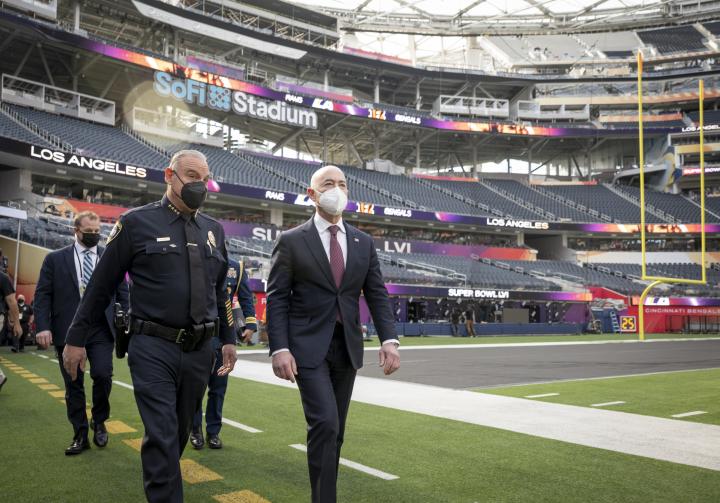Before Super Bowl LVI kicks off on Sunday, Feb. 13, a massive coalition of federal, state, and local officials is hard at work to help ensure the safety and security of employees, players, and fans during the big game.
U.S. Department of Homeland Security (DHS) Secretary Alejandro N. Mayorkas recently traveled to SoFi Stadium in Inglewood, Calif., to meet with law enforcement partners and the National Football League (NFL) to review plans and operations.

“Just like the game itself, vigilance is a team effort,” said Mayorkas, the principal federal official for domestic incident management.
For DHS’s part, the department will be dedicating more than 500 personnel to Super Bowl LVI. As with past Super Bowls, this event was voluntarily submitted to DHS for a risk assessment and classified as a Special Event Assessment Rating (SEAR) Level 1, meaning it has national and international importance and requires extensive federal support.
Security Initiatives
Several DHS agencies are working with state and local authorities and the NFL on a range of initiatives for Super Bowl LVI:
- The U.S. Coast Guard (USCG) is providing explosive detection canine teams and maritime security assets.
- The Countering Weapons of Mass Destruction Office (CWMD) is providing subject matter experts and technology to detect and prevent potential threats related to weapons of mass destruction.
- U.S. Customs and Border Protection (CBP) is providing assets including aviation security, video surveillance capabilities, and non-intrusive inspection of vehicles and cargo support. CBP officers will scan vehicles and cargo entering the stadium for contraband such as narcotics, weapons, and explosives. CBP plays a critical role in the fight against human trafficking and the disruption of counterfeit merchandise smuggling operations.
- The Cybersecurity and Infrastructure Security Agency (CISA) is working with partner authorities to identify, assess, and mitigate risks to critical infrastructure in Los Angeles. CISA is also serving as a liaison for private communications companies supporting the event. CISA has conducted cybersecurity vulnerability assessments, multiple planning exercises, and bomb safety workshops with state and local partners. During the Super Bowl, CISA will support emergency communications and monitor potential risks to critical infrastructure.
- The Federal Emergency Management Agency (FEMA) is providing Mobile Emergency Response Support (MERS) units to ensure that state and local security personnel can quickly coordinate with federal partners in the event of an emergency. MERS provides mobile telecommunications, operational support, life support, and power generation assets needed to respond to a natural or man-made incident or an act of terrorism. FEMA will activate federal response partners to lead emergency relief and recovery efforts, as necessary.
- Immigration and Customs Enforcement (ICE) Homeland Security Investigations (HSI) has deployed a task force to identify and combat human trafficking, as well as intellectual property enforcement teams to the City of Inglewood. CBP and HSI will conduct operations targeting counterfeit vendors and merchants of game-related sportswear as part of a crackdown on intellectual property rights violations. These operations help ensure fans are receiving official, safe memorabilia.
- The Office of Intelligence and Analysis (I&A) is working with the Federal Bureau of Investigation (FBI) to assess the threat landscape leading up to the Super Bowl. I&A is sharing timely and actionable information and intelligence with state and local law enforcement, including to inform security planning efforts.
- The Office of Operations Coordination (OPS) is supporting 24/7 information sharing with partner authorities.
- The U.S. Secret Service (USSS) is serving as federal coordinator for this event, leading coordination and integration efforts across all event partners.
- The Transportation Security Administration (TSA) is deploying multiple explosive detection canine teams as an added layer of security in key locations. TSA Visible Intermodal Prevention and Response teams will augment local law enforcement efforts. Further, the Deputy and Alternative Deputy Federal Coordinators for the Super Bowl are TSA personnel.
Security measures for Super Bowl LVI are underway elsewhere in the federal government as well.
For example, the U.S. Department of Transportation’s Federal Aviation Administration (FAA) has issued Temporary Flight Restrictions (TFR) and a No Drone Zone around SoFi Stadium on game day. The TFR will cover a ring of 30 nautical miles (34.5 miles) and up to 18,000 feet in altitude. Pilots and drone operators who enter the TFR could face civil penalties exceeding $30,000 and criminal prosecution.
On the local level, the Los Angeles Police Department (LAPD) recently released a statement addressing previous media reports about staffing concerns and declared the LAPD is “fully prepared to meet the public safety needs” of Super Bowl LVI and has been working on security measures for “more than a year.”
Authorities and the NFL also have partnered on a “If You See Something, Say Something”public awareness campaign throughout Los Angeles. On Super Bowl Sunday, game attendees and the general public can report suspicious activity by calling or texting this tip line: (562) 662-2344. Suspicious activity and threats of violence, including online threats, can also be reported to local law enforcement, FBI Field Offices, or a local Fusion Center.
